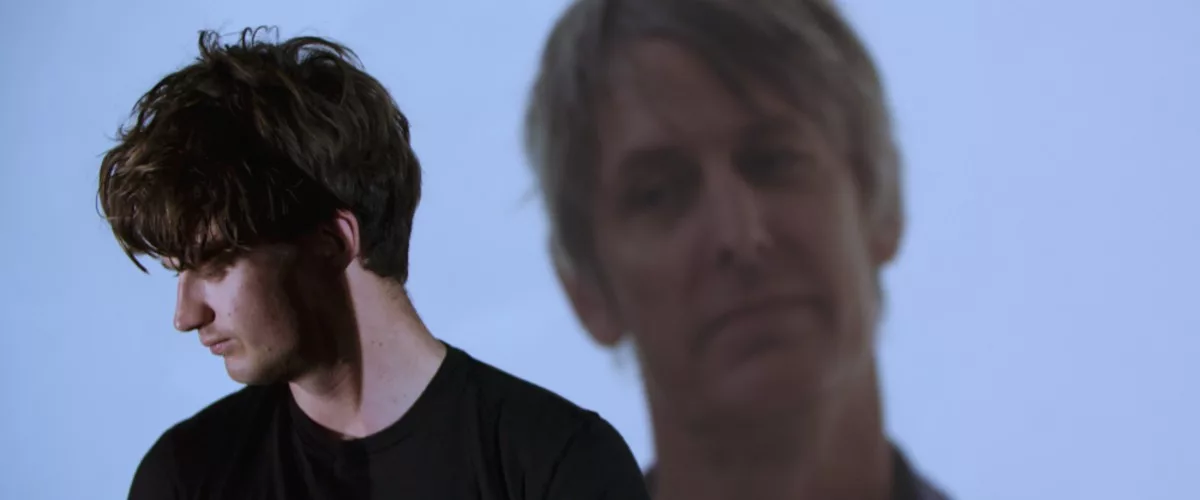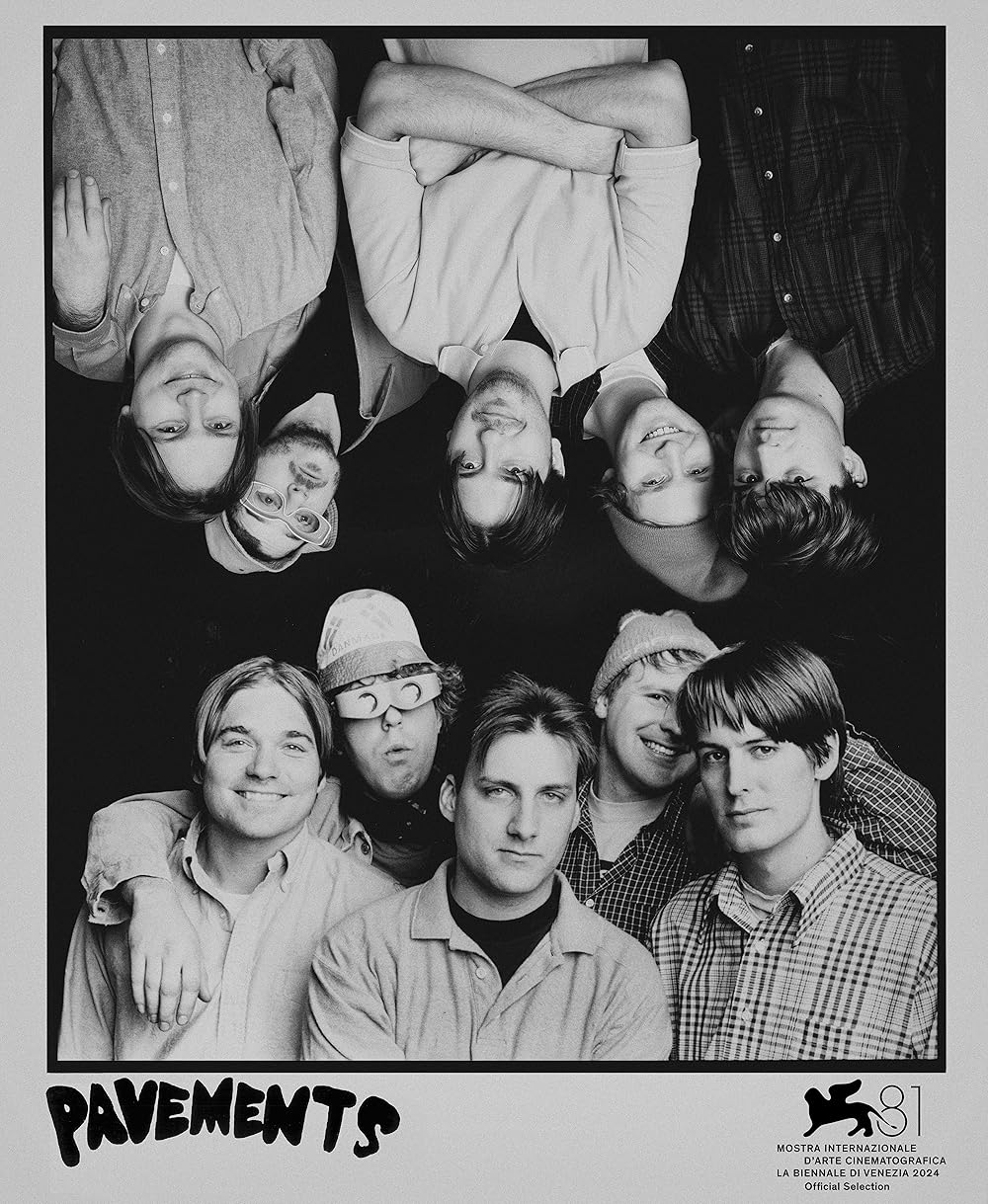The only request you can make of a documentary is for it to be as interesting as its subject. Alex Ross Perry’s slippery experimental mockumentary “Pavements,” a film about the 1990s slacker band behind Slanted and Enchanted and Crooked Rain, Crooked Rain, is as gleefully idiosyncratic and as suspicious of mainstream success as the band and its fans.
Though the film doesn’t totally embrace an easy rise and fall structure, or even a jukebox format that feeds viewers the songs they love along with the stories behind them, it doesn’t disavow those formats either. Instead, “Pavements” recalls the satirical spirit of “Walk Hard: The Dewey Cox Story” and the rock n’ roll mythologizing of “Rolling Thunder Revue: A Bob Dylan Story by Martin Scorsese.” It’s a film that takes these cliches and turns them inside out, lampoons them, and then reimagines them with such an unabashedly snarky tone, there’s never a second that feels forced, contrived, or sophomoric. Rather like Perry’s psychologically urgent girl rock drama “Her Smell,” “Pavements” is a work not readily definable.
“Pavements” is split into several competing segments: there’s a biopic being filmed called “Range Life: A Pavement Story,” a jukebox musical ramping up known as “Slanted! Enchanted! A Pavement Musical,” the conceiving of a museum exhibition of their archives named “Pavements 1933-2022: A Pavement Museum,” and a 2022 reunion tour which will welcome their first shows together since 2010. Only half of these events are real. But each collides and blends with one another, mixing and confusing fact and fiction, performance and sincerity, artifice and naturalism to wholly encompass the band’s artistry.
Perry doesn’t necessarily provide a throughline to contain these competing stories. In drips and drops he provides some history of the band: their beginnings at the University of Virginia, their move to New York City, the immense influence their suburban upbringing in Stockton, California provided their music, their touring with Sonic Youth, and their eventual commercial plateau after the release of their off-kilter, misunderstood masterpiece Wowee Zowee. Having said that, Perry quickly discards any chronological or biographical sense once he begins to fully embrace the experimental narrative elements of his film.
For the fictional “Range Life” section, Perry brings together actors to play the band members: Joe Keery as lead singer/guitarist Stephen Malkmus, Fred Hechinger as backing vocalist Bob Nastanovich, Nat Wolff as guitarist Scott Kannberg, Logan Miller as bassist Mark Ibold, Griffin Newman as drummer Steve West, and Jason Schwartzman plays Matador Records founder Chris Lombardi. We primarily focus on Keery, whose performance satirizes actors who take on biopic roles. When he considers why he took the part, for instance, he nonchalantly says he did so to “maybe win an award or something.” Keery also meets with a dialect coach, obtains a picture of Malkmus’ throat, and studies footage of Malkmus to mimic his mannerisms. Perry smartly doesn’t overplay these comedy bits. Rather, he allows the natural absurdity to pass along without mention.
For the jukebox musical, we go through the entirety of the casting process, the crafting of the choreography and arrangements, and the staging of the opening night show with its cast of musical theater actors. The idea behind the show is to make it like “American Idiot,” another dig the film makes against bands who’ve commodified their brands into kitschy cash grabs. In the rehearsal for the musical, the artifice is rendered bare as these rebelliously introspective songs lose their edge once they’ve parceled out into various bids for full-throated earnestness.
As these components coalesce, oftentimes through split screens, aspect ratio changes and archival footage, it’s worth remembering the plurality of the film’s title. Not only because we’re seeing several celebrations of the band happening at once. But also because we’re witnessing the contradictions within the band’s artistic desires. They abhorred selling out. But appeared in an ad for Apple. They prized their outsider mentality but desperately wanted wider recognition outside of being a “critics band.” All of these variations provide a full scope of the band: their insecurities, hopes and opinions.
And then, of course, there are the songs. While this isn’t your prototypical ‘play the hits’ documentary, that doesn’t mean a plethora of Pavement songs from across their career don’t take center stage. Their arrival, however, does come unexpectedly. Some come through the band’s actual rehearsals, others arrive in the film within a film—like when Keery as Malkmus lampoons a biopic cliche by writing “Stereo” on the spot—and others come when the musical theater actors perform “Cut Your Hair.” The film also features songs in concert footage, such as the infamous 1995 Lollapalooza show that saw an indignant crowd throw mud at the band, or bands like Soccer Mommy and Bully covering Pavement songs at the opening of their gallery show.
Perry’s “Pavements” could easily slip into being too winking, too cynical, too try-hard, or too ambivalent. But it doesn’t. Robert Greene’s nimble editing, the band’s on-camera playfulness, and Perry’s comprehensive knowledge of the group give this film an unlikely sincerity. “Pavements” exemplifies all the group represents to its loyal listeners, and why, as the film wants to call them, they are “the world’s most important and influential band.”




















